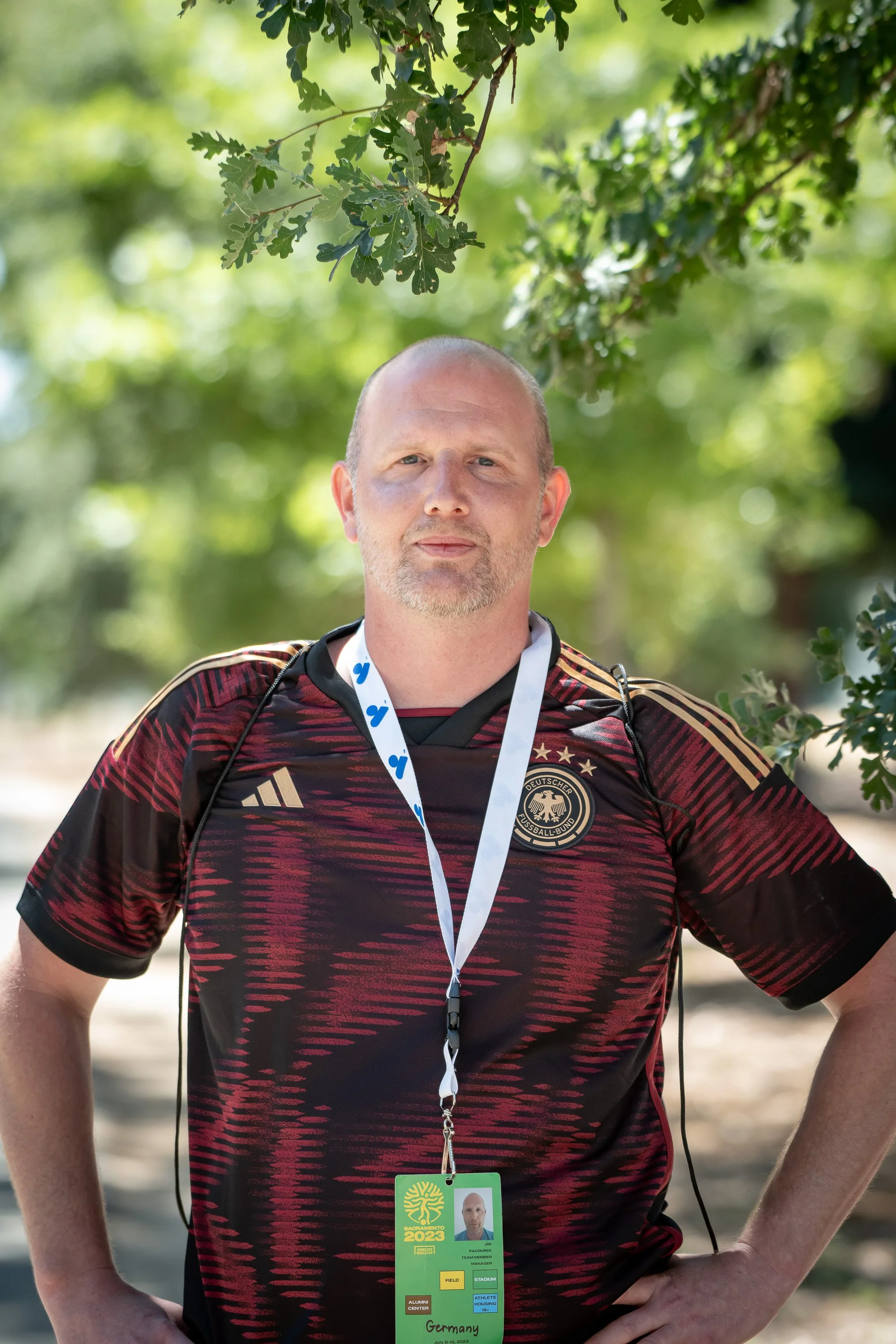GERMANY’S TEAM MANAGER INSPIRES ON-AND BEYOND-THE PITCH
Donning a black and red kit with gold accent, you will find a quiet and composed man who offers pats on the back and smiles to players as they exit the field. He exchanges words of encouragement and even manages a chuckle to lighten the mood. And then, as swift as a breeze, he bumps barricades with his hands to rile up support and energy. Jiří Pacourek, Germany’s team manager, knows how to rally the team in the Sacramento sun.
Pacourek’s story with the Homeless World Cup begins with his participation as a player in 2009. Having experienced depression, as well as a gambling and drug addiction, Pacourek was on the street in Czech Republic from 2004 through 2006. He eventually made his way to Hamburg, where he connected with Germany’s national coach and was convinced to play. He says that playing football for just two hours in the HWC allowed him to “forget everything beyond the pitch, including debt, stress, any problems. I was grateful that it gave me energy for the whole week.”
He recalls with vivid detail listening to Mel Young, cofounder of the HWC, speaking to teams on Copacabana Beach in 2010. Pacourek admits that his understanding of the English language was not as thorough at the time, but he was moved to memorise Young’s parting words for the tourney: “Everything you see, when you go back to your cities and lands, take this with you and give it to other people.”
He took this call seriously. He mentions that Germany does not have many dedicated resources for homeless support, and typically that support relates to basic needs and does not include play. Pacourek returned to Germany after the games to speak with the Federal Gazette and city government about homelessness. He went on to start a small project for sport and leisure for socially isolated people, then joined Don Bosco Nuremberg to assist young adults experiencing homelessness with their transition to stable housing. In 2011, he developed the nonprofit’s inaugural football tournament and has since collaborated with FC Bayern Munich to develop a multiannual preventative gambling workshop.
Credit: Dan Higginson
Pacourek experienced his own transition from player to coach of the German team in 2013. He describes a distinct and novel responsibility to players: not only to help them play their best, but to inspire them to follow in his footsteps in making change. “Many people should be working toward this. I say to our players, ‘talk to people, learn from new people.’ When you don’t feel confident in English, try it anyway. What you see, you can take with you in your lives.”
He continues to manage the German team and find joy each year. Going to the games made him realise, there are so many languages spoken, “but when you have ball, you understand everything.”
Pacourek sees sport and play as a means to build relationships and bridge gaps between people. He says the type of sport played matters less than the relationships that can come from playing together. Whether we play football, ping-pong, or chess, according to Pacourek, “we must spend time together and talk together.”
These types of relationships, he says, are crucial. He dreams of a day where the mission of the HWC expands further into individual towns and provinces. Considering each country can bring only eight representatives, there are many others who can benefit from such play, from experiencing the general atmosphere of hope and collaboration of the HWC.
He encourages others to lean into the experience and view people who experience homelessness as people first. He does what he can to foster collaboration and eliminate stigmas about homelessness. Pacourek even spoke with Sacramento police during the tournament to encourage them to simply spend time with people on the streets and understand their points of view. He contends, “Homelessness is not a sickness. It is not a crime.”
Ultimately, Pacourek views sport as a pathway to belonging and inclusion. He says with a smile, “When you are on the field, everything is equal. Sport is good for self-esteem. Everyone needs someone that comes to them to say, ‘You’re a good person.’” Pacourek is certainly one of many good people at these 2023 games.
Words: Haley Lucero
Credit: Anita Milas, Dan Higginson


